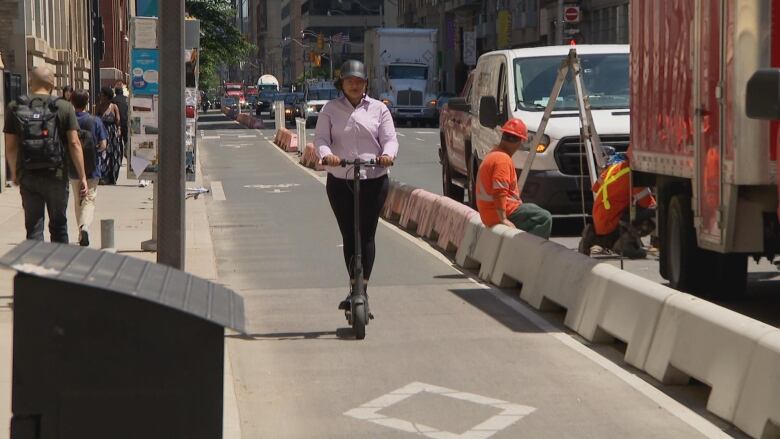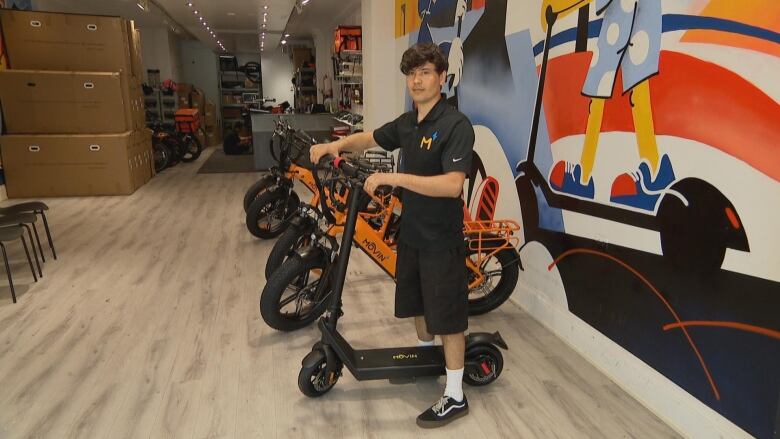Toronto's e-scooter ban won't deter riders, advocates say
Riders, operators and sellers urge city to change course

Electric scooter riders, service operators and sellers say they're keen to see e-scooters legalized and regulated, even after city council one again voted to keep them illegal on Toronto streets.
And unless the citychanges its approach, some say their use will only increase.
On Thursday, council once again votedagainst making the vehicles legal, opting instead to ask higher levels of government for more regulation and standardization, despite some councillors' frustration with the lack of enforcement of city bylaws.
"I can't imagine life without it," saidCaryma Sa'd, an avid e-scooter user, who says they'refun to use, help her avoid Toronto traffic andareeasy to charge.
"So many people ... are using these scootersand I think that if they started to enforce in a more heavy-handed way, they would find that it's not possible to ticket everyone."
In all of last year, policeissued just 89 tickets to people riding e-scooters or bikes on sidewalks, theytold councillorsata meeting Thursday. Penalties related to driving motor vehicles or unauthorized vehicles on sidewalks, bike lanes and other public paths range from $60 to $90,the city toldCBC Toronto in an email Friday.
The city acknowledges its ability to enforce the bylaw is limited, with education and awareness its best bet at limiting use for now. But Sa'dsays keeping e-scooters illegal doesn't reflect what's going on in Toronto's streets.
"The reality on the ground is that people use scooters, and I think that there's an opportunity here to ensure that their use is regulated, that safety is taken into consideration," she said.
Demand tendingup, seller says
The city currently has laws prohibiting the use of electric scooters in the city. Since 2021, it has also continuously refused to join the ongoing provincial pilot program testinge-scooters in municipalities.
Russell Murphy, the global communications director for e-scooter rental platform Lime, said he was disappointed with the city's latest decision to opt out of the pilot.
He said a rental program would help the city tailor limitations on the speed of vehicles, where they can operateand ensure a level of accountability.
"I think [what] we saw yesterday actually goes against a lot of the will of Torontonians," he said.
The company,which operates in British Columbia, Alberta and is now coming to Mississauga in Ontario, isasking council to have an open mind aboutthe benefits of its service.
"We're hopeful that the city will continue to study this, will continue to be in conversation ... and that they can talk to us as experts."
The city said its decision to opt out of the pilot was partly because of concerns cited by people from the disability community of having undocked rental scooters scattered throughout the city.
But Asghar Mehrzada, a service manager at Toronto e-bike and e-scooter shopMovin' Mobility, says he's seen sales and interest in privately owned e-scooters go up in recent years. The shop informs customers they aren't allowed to use them in Toronto, but it doesn't stop people from purchasing them, he added.
"There's lots of demand," he said.

People like that they can easily transport scooters and don't need a parking spot to lock them throughout the city, Mehrzada said.
"I don't see anyonestopped by police," he said.
Boost penalties or change rules, lawyers say
On Thursday, city council voted to ask the province to look into creating licensing and insurance schemes to help in the case of injuries or collisions,and the federal government to better standardize how e-scooters are designed.
Mike Smitiuch, a personal injury lawyer in Toronto,agrees those are needed. He says his office is seeing more and more calls from people involved in e-scooter collisions, which are often costly and difficult to recover from.
"I strongly urge better enforcement, stricter laws, greater penalties to act as a deterrent for people who are out there just recklessly going about the city."
David Shellnutt, a personal injury lawyer specializing in collisions involving cyclists, says the city's focus should be on finding ways to make it easier for people to use modes of transportation beyond cars.
"We should at all times be trying to get people out of cars into greener and less traffic-causing vehicles," he said.
Shellnutt said it's clear that turning a blind eye to the problem, or relying on police to enforce the city's prohibition rule, isn't working.
"We just need to be bold and and try new things," he said.














_(720p).jpg)


 OFFICIAL HD MUSIC VIDEO.jpg)
.jpg)



























































































